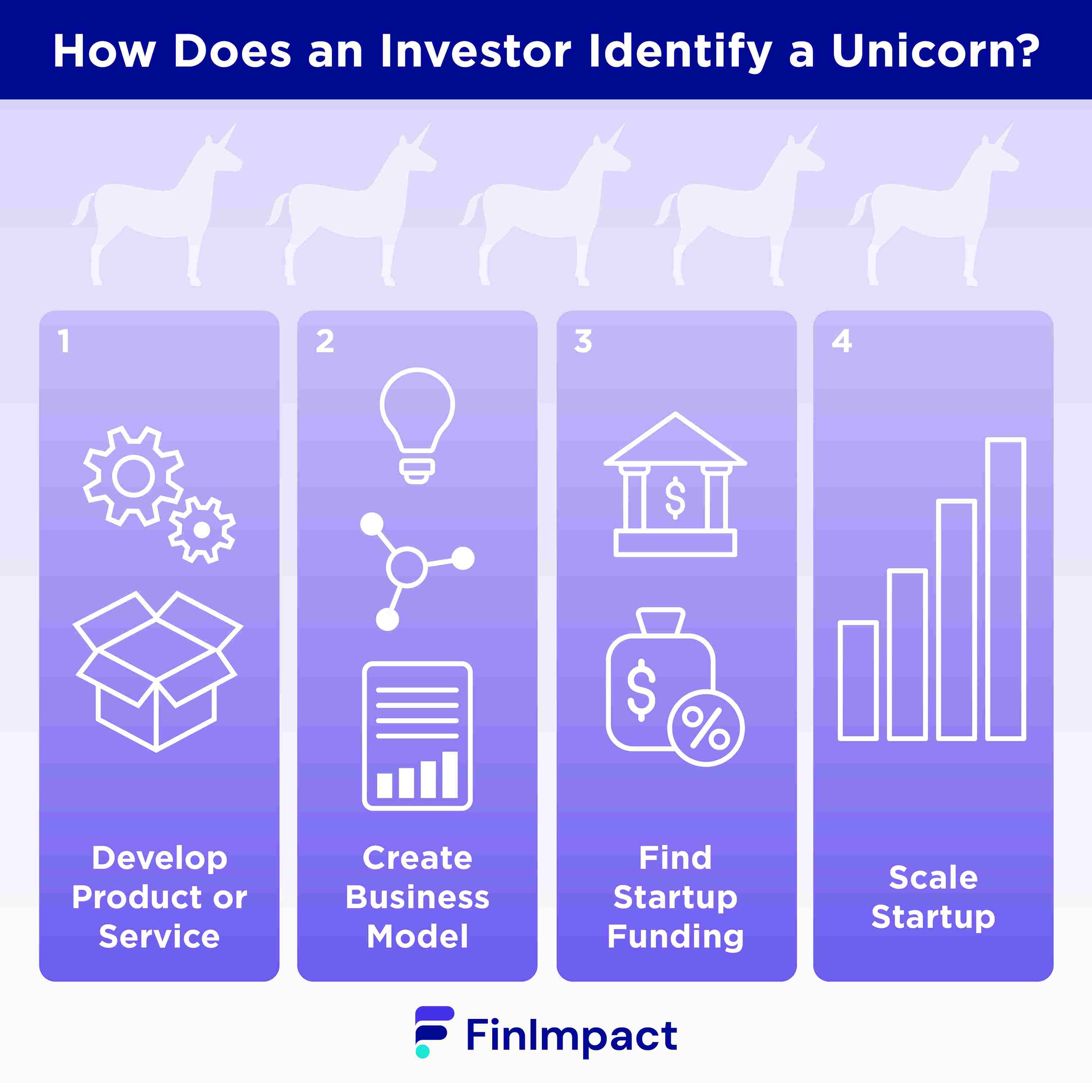
| All content presented here and elsewhere is solely intended for informational purposes only. The reader is required to seek professional counsel before beginning any legal or financial endeavor. |
Typically, venture capitalists, private wealthy individual investors and investment firms invest in unicorn startups. Smaller investors and retail investors don’t always have the capital necessary to fund these startups. However, many unicorns also draw the attention of seed investors through seed stages of funding.
Understanding a Unicorn Startup
Firstly, to better understand, what is a unicorn startup? Consider the following:
Know what is unicorn status: A company is considered to have unicorn status when it is privately held, meaning not a publicly traded company, and its valued at or above $1 billion U.S. dollars. It can go on to be a publicly traded company and have an IPO but then it is no longer considered to be a unicorn.
Specifically, what is a tech unicorn? A tech unicorn is simply a technology-based startup company that meets the criteria for being a unicorn: again, is privately held and worth $1 billion or more. A tech company deals with technology such as electronics based technology, designs software, does research and development for technologically based goods and services or manufactures tech products such as mobile devices or computers.
What is a seed investor? A seed investor invests capital into a startup and in return the investor gets an equity stake in the company or a convertible note stake in the startup. The seed investor generally makes money once the startup gets sold or goes public, or they otherwise sell part of their initial investment for more than what they paid for it.
Where Did the Term Unicorn Company Come From and What are Some Characteristics These Startups Have?
Unicorns are mythical creatures and the name unicorn startup references that mythical creature and its rarity. It’s so rare to be a privately-held startup company that is worth $1 billion or more, which is the unicorn startup definition. This catchy term was initially used in 2013 by venture capitalist Aileen Lee and it stuck and is still used almost a decade later. When she came up with the term, there were only 39 unicorn startups, and now there are almost 900. Reaching such a prestigious valuation is rare like a unicorn so the term became well-known in the startup world and the status strived for by startup founders.
These startups may differ in where they were founded, the industry they’re in, and who founded them, but they also have a lot of similarities. Typically, unicorn startups tend to be:
Tech-savvy: Growing companies need to scale and the smart ones use technology to help them do just that.
Disruptive: Unicorns tend to disrupt an industry; often completely shaking it up. The industry may never be the same again. Netflix is a well-known example of a disruptive company.
Consumer-focused: Without consumers, there’s no business, so it’s crucial to be focused on the needs and wants of your consumers. Know your market so you can know what and how to market to them and what to avoid.
Growth-driven: Startups, especially unicorns tend to scale quickly so they’re growth-driven. They often have a high burn rate and may take a while to be profitable.
Efficient: Startups tend to want to run lean and need to be efficient to do so. Efficiency can be increased due to customer feedback, testing, automation, and collaboration.
How is a Business Valued as a Unicorn?
Typically unicorns are considered such once they reach a valuation of $1 billion or more and are still privately-held. This means that companies on the stock markets don’t count. Another thing to note is that most unicorn startups are not profitable. In fact, they tend to lose large amounts of money during the startup phase because of how fast they’re growing.
Determine the value at which a company becomes a unicorn and come up with 5-7 global unicorn companies, including a short description of what they do and how much they’re worth.
Five global unicorn companies include:
Stripe: Valued at $152 billion, this company is a global payment processing and payment payout platform. It has headquarters in San Francisco, U.S.A and Dublin, Ireland.
SpaceX: Valued at $100 billion. SpaceX launches rockets, as well as manufacturing and designing them. It’s based out of California.
Grab: Valued at $40 billion. This is a multinational technology company and an app developer based out of Singapore.
NuBank: Valued at $30 billion. The largest fintech bank in Latin America has headquarters in Sao Paulo, Brazil and engineering offices around the world.
JD Digits: Valued at $19 billion. This company was founded in 2012 in Beijing, China to connect financial and physical industries with digital technology.
How Does an Investor Identify a Unicorn?
An investor typically identifies a unicorn by a few strategic points. They also consider the founder, the team, the potential market size, and the competition. To create a unicorn and be found by an investor, you need to consider the following:
1.Develop a viable product or service: Fill a void or improve on something that is already doing well but could do better. Don’t have building a unicorn as the goal, but instead think of how you can add value to whatever industry you go into.
2. Create a business model: An idea without a plan is just a dream. And as the saying goes, if you fail to plan, you plan to fail. So, put pen to paper and write it down! Create an entire business plan including financial projections, a mission statement, and a timeline. Review it and see if the idea seems viable or if it’s time to start over.
3. Find startup funding: If you believe in the product or service, hopefully others will too. You will need to pitch your idea to potential investors. You may need seed money for startups and may even accept pre seed investments to fund your business.
4. Scale your startup: Startups grow fast and in order to do this, you’re going to need capital and manpower. Hire the right team that is collaborative, smart, and dedicated. Don’t be afraid to go big.

Who Invests in a Unicorn?
Typically, unicorns attract a certain type of investor. This is for many reasons, including the risks, the large amount of capital needed, and the fast growth that not all investors can handle. Retail investors, small investors, and risk-averse investors probably won’t have the capital or the desire to invest in a unicorn.
The types of investors that invest in unicorns usually include:
Investors who know the company: The investor may know the founder, have worked with some of the team members or may already know the product because they’re in the same industry themselves. This is a target investor because they are already familiar with the company and generally need less convincing to invest.
Venture capitalists: These companies are designed to invest in startups and are always on the hunt for a unicorn. They look for companies with a high potential for growth and invest in them, often guide them, and receive some type of equity for their investment.
Well-known private investors: Risk takers who may have made hundreds of millions or billions from their respective industries and want to diversify, often invest in unicorns. Examples include Mark Cuban and Ashton Kutcher.
How Can I Use Investment Funds in My Startup?
Funds for a startup are typically used for launching the business, product development, marketing, research, obtaining equipment, leasing or buying facilities, and hiring staff.
However, there may be limitations on how you can use your startup funds. For example, seed money may be used differently than capital provided by venture capitalists. Venture capitalists typically have attorneys draw up specific contracts that include what the money can and cannot be used for. It’s important to read everything before you sign it, hire attorneys as needed, and meet all of your contract obligations.
It may be obvious, but sometimes it’s easy to get caught up in the fast-paced startup world. Remember that you don’t commingle business and personal funds. Hire an accountant to keep you on track and don’t use any funds for anything that is illegal.
What are the Chances of a Business Becoming a Unicorn?
To put it bluntly, it’s very unlikely to be the founder of a unicorn. In fact, only three out of every five million companies become one. If you’re a percentage person, that’s a 0.00006% chance.
With that being said, nothing is impossible, and you may just have what it takes to reach this mythical status. Typically, it takes a company between four and seven years to reach unicorn prominence.
Is a Unicorn Managed Differently Than Other Startups?
A unicorn isn’t necessarily managed any differently than any other startup, but there may be more pressure, a more fast-paced environment, more at stake, and more employees and investors to deal with.
Some useful tips to consider when creating a unicorn startup include:
Aim for global reach: The global market can be huge, so don’t rule it out. The more people that know about your product or service, the more potential investors, and then the more revenue or likelihood of an acquisition or profitability later on.
Use technology: So many unicorns are centered around technology and for good reason. The tech sector isn’t slowing down. Demand is increasing and technology can not only help us communicate, but it can solve worldwide problems, ease daily tasks, and encourage collaboration and idea sharing in easy formats.
Hire well: Your team matters. You will spend a lot of time with them and investors often say they invest in the people more so than even the product. Get people that know the industry and want to work in a fast-paced startup environment. Remember to listen to their opinions, show them they’re valued, and compensate them fairly.
Create a long-term vision: And stick with it. Everything your company does should align with this vision. For example, a company that harnesses wind energy is eco-conscious and it should operate with those values in mind.
Know your customer: Have a pipeline of leads all the time and market to them. Use them to test out ideas, products and services. Don’t misread the market. Whether your company is going to cater to small businesses or individual consumers, know the demographics, and what their patterns are.
Business Mentoring Organizations That Could Help
Businesses can always use a little extra help. Check out some of these business mentoring organizations that entrepreneurs can turn to for assistance:
SBA: Check out all that the Small Business Administration offers including their resource partners, networking events, digital information, and more.
Score: This is also offered by the SBA and is a mentorship program for small business owners. In fact, it’s the largest network of small business mentors in the country.
Chamber of Commerce: Not free, but often affordable, and a great way to connect with other business owners and the general public. Most towns and cities have a version of this online and in person.
Industry veteran: Don’t be afraid to reach out to someone you know or don’t know. Compliments usually don’t hurt and see if they would be willing to mentor you or at least lead you in the direction of someone who could.
LinkedIn: Use this free site to make business connections and see where they may lead.